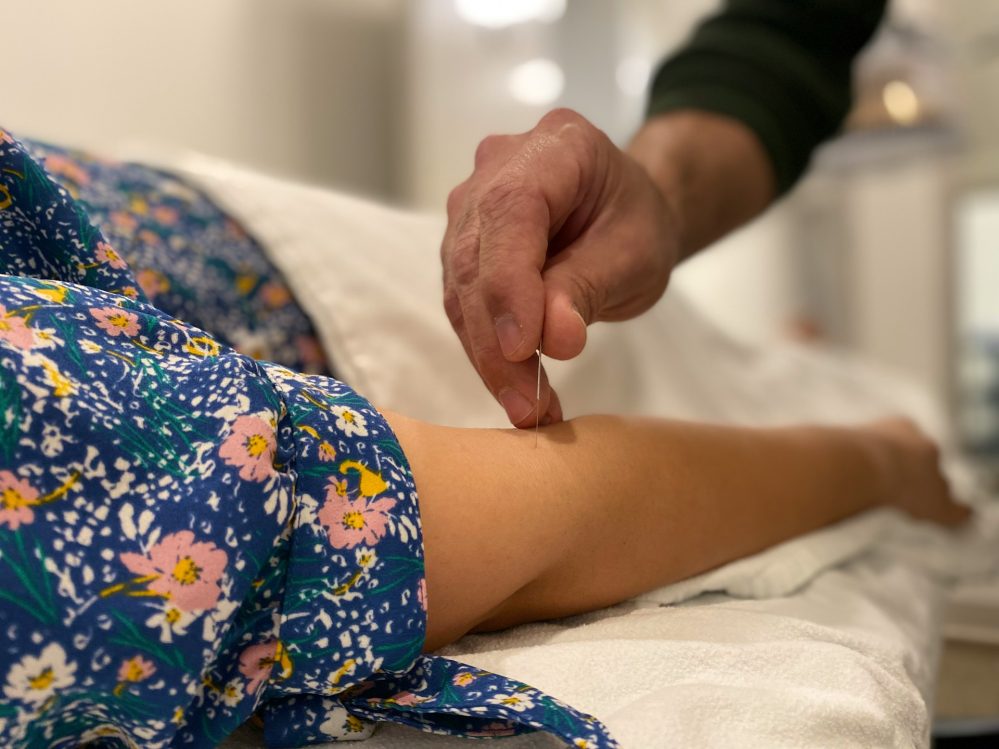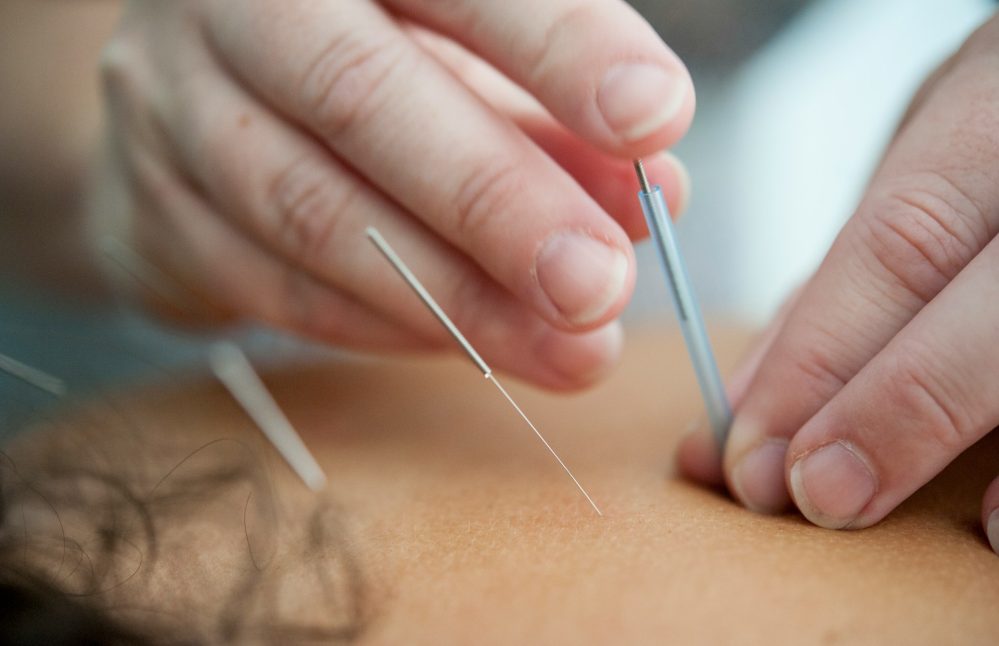There’s nothing quite like the rejuvenating power of a good night’s sleep—waking up refreshed and ready to take on the day. However, for some people, no matter how tired they feel, sleep remains elusive, and they find themselves tossing and turning through the night. In more severe cases, this struggle is known as insomnia, a condition that can negatively impact many aspects of life, including mood, energy levels, cognitive function, and overall health. Insomnia can lead to chronic fatigue, irritability, and reduced quality of life, making daily activities feel like an impossible challenge.
To avoid relying solely on medication, which can have side effects and potential dependencies, many individuals with insomnia seek out alternative treatments. Acupuncture for insomnia has emerged as a popular and effective option, offering a natural way to improve sleep quality and restore balance to their lives. Read on to learn more about this promising alternative.
What Is Acupuncture?
Acupuncture is a therapeutic practice that involves the insertion of thin needles into acupoints. Acupoints are believed to lie along pathways called meridians, which are channels through which life energy, or “Qi,” flows.
Understanding the intricate mechanisms of acupuncture can be challenging; however, at its core, acupuncture is a natural process that prompts the body to release its own naturally occurring pain-relieving and mood-enhancing chemicals. Inserting needles into acupoints stimulates nerves and muscles, enhancing blood circulation and promoting relaxation. This gentle, non-invasive process empowers the body to manage pain and stress more effectively.
The origins of acupuncture date back over 2,500 years and are rooted in traditional Chinese medicine, making it one of the oldest healing practices in the world. However, over the centuries, acupuncture has evolved and spread globally, gaining recognition in modern medicine for its potential to address various health conditions, from chronic pain to insomnia. Due to its versatility and effectiveness, acupuncture has been integrated into many healthcare settings, including clinics, hospitals, and hospices.
In addition to needle insertion, other forms of stimulation can be used in acupuncture, including:
— Heat (Moxibustion): Burning a herb near the skin to warm and stimulate acupoints.
— Pressure (Acupressure): Applying physical pressure to acupoints.
— Friction: Rubbing or massaging the skin to stimulate acupoints.
— Suction (Cupping): Using cups to create suction on the skin, stimulating acupoints and enhancing blood flow.
— Electromagnetic impulses: Applying electrical pulses to needles to enhance their effects.
Benefits of Acupuncture for Sleep

Acupuncture has shown potential in improving sleep quality and addressing various insomnia symptoms. Although the precise mechanisms behind its effects are not fully understood, many individuals report significant improvements in their sleep patterns after undergoing regular acupuncture treatments. Specifically, acupuncture can improve sleep quality, increase sleep time, reduce nighttime awakenings, and alleviate pain. These benefits are particularly notable in people whose insomnia is linked to conditions such as depression, menopause, or chronic pain.
Scientific research has extensively explored the effectiveness of acupuncture in managing insomnia. A comprehensive review of 24 randomized controlled trials (RCTs) compared acupuncture to pharmacotherapy and sham acupuncture. The findings were compelling, showing that acupuncture significantly enhanced sleep quality in insomnia patients, as measured by the Pittsburgh Sleep Quality Index (PSQI). This meta-analysis revealed that patients experienced significant improvements in their insomnia symptoms after three to four weeks of consistent acupuncture treatment, providing evidence of its effectiveness.
Additionally, acupuncture has been found to be a beneficial alternative to traditional pharmacological treatments for insomnia. Unlike medications, which can have side effects and may lead to dependency, acupuncture provides a natural and holistic approach to enhancing sleep without the risk of adverse effects. This makes it an attractive option for individuals seeking non-pharmacological treatments for their sleep disorders.
How Acupuncture Works for Insomnia
Acupuncture is believed to help with insomnia through several mechanisms, which have been supported by both traditional Chinese medicine principles and modern scientific research.
Firstly, according to TCM, insomnia is often caused by imbalances in the body’s energy flow and disruptions in the balance of yin and yang. Acupuncture for sleep aims to restore these balances by stimulating specific acupoints corresponding to various organs and functions. This regulation of Qi helps to promote overall harmony within the body, which is believed to improve sleep quality.
Additionally, modern scientific research suggests that acupuncture can influence the central nervous system. By inserting needles into specific acupoints, acupuncture stimulates the release of neurotransmitters and hormones such as serotonin, endorphins, and melatonin. These chemicals play crucial roles in regulating mood, reducing pain, and promoting relaxation, all of which contribute to better sleep.
Number of Acupuncture Sessions Needed for Insomnia
The typical course of acupuncture treatment for insomnia involves multiple sessions over a period of weeks or months. Generally, practitioners recommend starting with one to two weekly sessions for the first four to six weeks. This initial phase allows the body to respond to the treatment and provides enough time to observe any improvements in sleep quality. After this period, the frequency of sessions may be reduced based on the patient’s progress, often transitioning to maintenance sessions every two to four weeks.
It’s important to note that individual responses to acupuncture can vary significantly. While some people may experience noticeable improvements in their sleep patterns after just a few sessions, others might require a more extended treatment period to achieve the same results. Factors such as the severity of insomnia, underlying health conditions, and overall response to acupuncture play crucial roles in determining the optimal number of sessions for each individual.
What to Expect from Acupuncture

A typical acupuncture session for insomnia begins with a consultation. The practitioner assesses the patient’s overall health, sleep patterns, and specific symptoms to identify the most appropriate acupoints for treatment.
To prepare for the appointment, wear loose-fitting clothing, eat a light meal a couple of hours beforehand, and avoid caffeine. It’s also important to set aside time to relax before and after the session, bring a list of any medications or supplements you’re taking, and ensure your cell phone is turned off to minimize distractions. These steps help ensure a more effective and comfortable treatment experience.
During the session, the patient will lie comfortably on a treatment table, and the practitioner inserts thin, sterile needles into specific points. The insertion of the needles is usually painless, but some patients may feel a slight tingling or dull ache at the acupoint. The needles are typically left in for around 20 to 30 minutes. In some cases, the practitioner may gently manipulate the needles or apply heat or electrical pulses in order to enhance the therapeutic effect.
Potential side effects or discomfort during or after acupuncture are generally minimal. Some patients may experience slight bruising, soreness, or light bleeding at the needle insertion sites. Occasionally, individuals might feel lightheaded or tired after a session, but these effects usually subside quickly.
Therefore, after an acupuncture session, it’s important to avoid certain activities to ensure safety and maximize the treatment’s benefits. So, you must refrain from using digital screens, engaging in heavy exercise, encountering stressful situations, and using ice for pain relief. Avoiding these activities helps manage stress responses, relax the body, and enhance the overall effectiveness of the energy reset provided by acupuncture.
Considerations Before Trying Acupuncture
Before starting acupuncture treatment, especially for insomnia, it is crucial to consult with a qualified acupuncture practitioner, particularly if you have any underlying health conditions. Specific contraindications or precautions need to be considered, such as pregnancy, bleeding disorders, or if you are taking blood-thinning medications.
Individuals with pacemakers should inform their practitioner, as some acupuncture techniques, like electroacupuncture, may interfere with the device. It’s also essential to disclose any history of fainting or seizures to ensure appropriate precautions are taken during the treatment.
People with compromised immune systems should discuss their condition with the acupuncturist to prevent any risk of infection from needle insertion. Moreover, those with skin infections or open wounds at potential needle sites should wait until these heal before undergoing acupuncture.
Providing a comprehensive medical history helps the acupuncturist tailor the treatment to your specific needs, ensuring the safest and most effective outcomes.
The Bottom Line
All in all, acupuncture offers a promising solution for those struggling with insomnia, helping to improve sleep quality, reduce nighttime awakenings, and increase overall sleep duration. Supported by scientific research, acupuncture has demonstrated significant benefits for individuals dealing with various underlying conditions that contribute to sleep disturbances. For anyone looking to enhance their sleep naturally and safely, acupuncture presents a viable and effective option.
The American Institute of Alternative Medicine (AIAM) offers an exceptional acupuncture degree program designed to help students master this ancient art. Our curriculum and experienced faculty provide the knowledge and skills necessary to excel in the field of acupuncture. So, enroll in our program today and start your journey toward becoming a skilled practitioner!
Frequently Asked Questions (FAQs)
Are there any side effects of acupuncture for insomnia?
Acupuncture for insomnia is generally safe and well-tolerated, but some people may experience minor side effects such as slight bruising, soreness, or light bleeding at the needle insertion sites. Occasionally, patients might feel lightheaded or fatigued after a session, but these effects are usually temporary and subside quickly.
How long does it take for acupuncture to work for sleep?
The effects of acupuncture on sleep can vary; some individuals may notice improvements after just a few sessions, while others might require several weeks of treatment. Typically, significant benefits are observed after four to six weeks of consistent treatment, with sessions held one to two times per week.
Where are the acupuncture points for insomnia?
Acupuncture points for treating insomnia are commonly located on the head, ears, hands, and feet. Specific points often used include Shenmen (HT7), Anmian (EX-HN22), Sanyinjiao (SP6), and Yintang (EX-HN3), among others, which are selected based on individual assessment and traditional Chinese medicine principles.